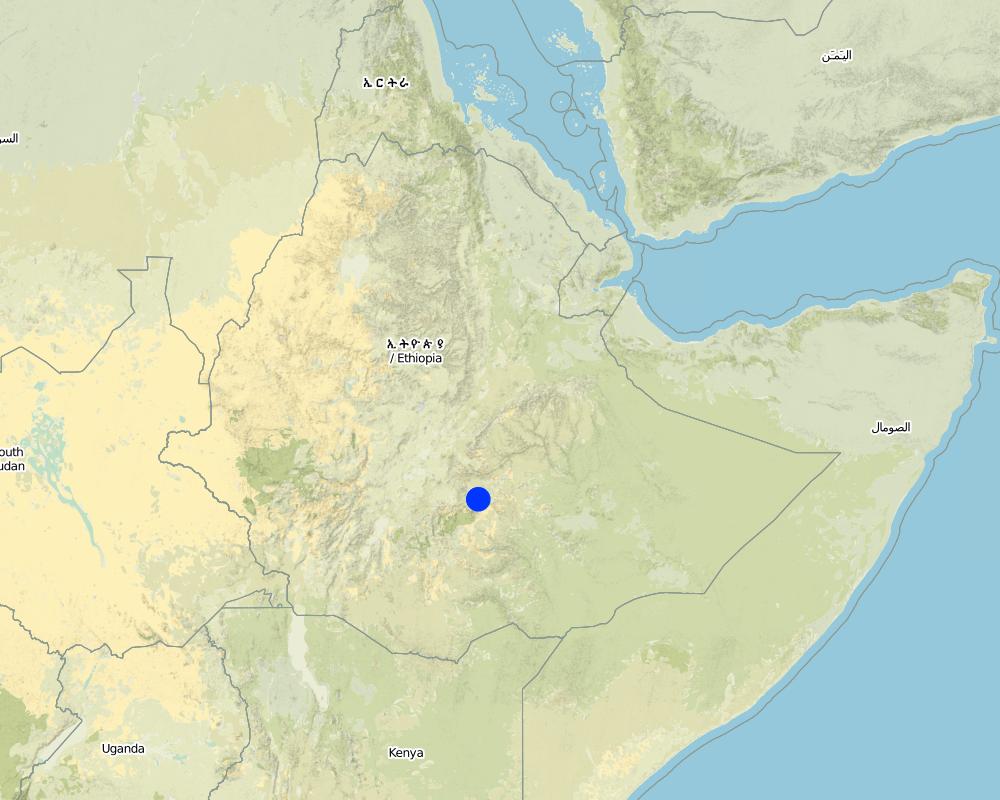Local Level participatory planning approach (LLPPA) [Ethiopia]
- Creation:
- Update:
- Compiler: Philippe Zahner
- Editor: –
- Reviewer: Fabian Ottiger
approaches_2675 - Ethiopia
View sections
Expand all Collapse all1. General information
1.2 Contact details of resource persons and institutions involved in the assessment and documentation of the Approach
Name of the institution(s) which facilitated the documentation/ evaluation of the Approach (if relevant)
Swiss Agency for Development and Cooperation (DEZA / COSUDE / DDC / SDC) - Switzerland1.3 Conditions regarding the use of data documented through WOCAT
The compiler and key resource person(s) accept the conditions regarding the use of data documented through WOCAT:
Yes
1.4 Reference(s) to Questionnaire(s) on SLM Technologies

Stablized Stone Faced Soil Bund [Ethiopia]
Stablized bund constructed fron stone and soils on the farm land along the contour and planted with multipurposive plant species
- Compiler: Unknown User
2. Description of the SLM Approach
2.1 Short description of the Approach
Participatory planning tools using various PRA techniques to enable the local community to identif their problem prioritize to sellect suitable measures & activities (planing, implementing & mgt of conservation based initiatives.
2.2 Detailed description of the Approach
Detailed description of the Approach:
Aims / objectives: Aims at the sellection of suitable measures & activities in line with the problems needs of the community & individuals relating to soil & water conservation, To develop (enable) the community to involve (participate) fully inplaning, implementing, monitoring managing of conservation based initiatives and decision making, Aims at the selection of suitable measures and activities in line with the problem and needs of the community and individuals, Hence promotion of productivity of the project areas to address the problems, Employ a wide range of methods facilitate community participation in planning discustion on subject area (suitation), i.e. general discustion with community, Group and indvidual discussion community meeting, consulting., Identify targeted areas, initial meeting with community leaders, adminstrators 1st meeting with community. Form (sellect) development team., Problem identification prioritize sellect suitable measures & activities work plan pre paration, planning implementing, monitoring evaluation., Identify the major problems, prioritize identification sellection of proposed development, measures. Work plan preparation, Implementation of sellected activities.
2.5 Country/ region/ locations where the Approach has been applied
Country:
Ethiopia
Region/ State/ Province:
Oromiya
Map
×2.6 Dates of initiation and termination of the Approach
Indicate year of initiation:
1992
2.7 Type of Approach
- project/ programme based
2.8 Main aims/ objectives of the Approach
The Approach focused mainly on SLM with other activities (Micro credit schems, forest development, water development, development of infrastructure.)
The SLM Approach addressed the following problems: Erosion problem (Soil and Water), Food shortage problem, Infrastructure problems, Production problems.
2.9 Conditions enabling or hindering implementation of the Technology/ Technologies applied under the Approach
social/ cultural/ religious norms and values
- hindering
Need external inputs, Lack of responsibility to keep & maintain
Treatment through the SLM Approach: Provide training, encourage the participation of community in all activities.
availability/ access to financial resources and services
- hindering
Poverity; less production yield, shortage of farmland, increasing of family size
Treatment through the SLM Approach: Apply income generating projects, intensfy family planning programme, improve local farming system, effective management.
institutional setting
- hindering
Less finanical capacity & skilled man power, lack of well & highly organized institue
Treatment through the SLM Approach: Encourage the involvement of different NGO's strengthen their capacity.
knowledge about SLM, access to technical support
- hindering
Lack of skilled manpower, ignoring of indigenous k/dge; less technical awareness of farmers.
Treatment through the SLM Approach: Capacity building, community training, encourage (modify) indigenous k/dge.
3. Participation and roles of stakeholders involved
3.1 Stakeholders involved in the Approach and their roles
- local land users/ local communities
Specific ethnic groups: Locally existing groups
Because of the local cultural norms cultural barriers. Mainly men be a team leader, and excutives. Group 1 & group 2 By ranking their wealth & using vulnearability ranking & the sellected criteria of land size & live stock holding.
- national government (planners, decision-makers)
Regional state, W/resource dev. Authority MOA.
- international organization
3.2 Involvement of local land users/ local communities in the different phases of the Approach
| Involvement of local land users/ local communities | Specify who was involved and describe activities | |
|---|---|---|
| initiation/ motivation | passive | consuling; Participate by consulting involved by answering question area. |
| planning | interactive | Mainly: rapid/participatory rural appraisal, public meetings; partly: workshops/seminars, interviews/questionnaires; Planning prepared by Devt. Team descussed with communities. |
| implementation | external support | casual labour, responsibility for minor steps; Participatte by his labour & contribute equipment (materials) |
| monitoring/ evaluation | passive | Mainly: interviews/questionnaires, public meetings; partly: measurements/observations; Involved by answering questions |
| Research | none |
3.4 Decision-making on the selection of SLM Technology/ Technologies
Specify who decided on the selection of the Technology/ Technologies to be implemented:
- mainly land users, supported by SLM specialists
Explain:
Land users sellect the suitable measures of activities facilitated by SWC specialists.
Decisions on the method of implementing the SLM Technology were made by mainly by SLM specialists with consultation of land users
5. Financing and external material support
5.1 Annual budget for the SLM component of the Approach
Comments (e.g. main sources of funding/ major donors):
Approach costs were met by the following donors: international non-government (-): 100.0%
7. References and links
7.1 Methods/ sources of information
- field visits, field surveys
- interviews with land users
Links and modules
Expand all Collapse allLinks

Stablized Stone Faced Soil Bund [Ethiopia]
Stablized bund constructed fron stone and soils on the farm land along the contour and planted with multipurposive plant species
- Compiler: Unknown User
Modules
No modules


